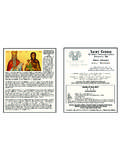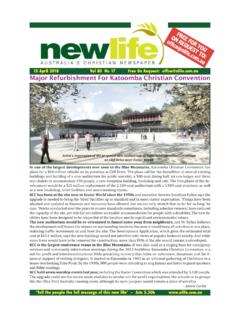Transcription of Calvary Chapel Bible College - Pastor Lee Coe
1 Calvary Chapel Bible College PASTORAL MINISTRY. (1989). SELECTED BIBLIOGRAPHY OF BOOKS PERTAINING TO MINISTERIAL LIFE AND WORK. 1. Adams, Jay. Shepherding God's Flock. Zondervan, 1974. (the author probably best explains the nature of this book by describing it as a handbook of pastoral ministry, counseling, and leadership the reading of this work of over 500 pages will prove greatly beneficial). 2. Baxter, Richard. The Reformed Pastor . Banner of Truth, 1979. (a classic work by a great Puritan Pastor ; the book was a series of messages to ministers in 1656, pleading with them to take their pastoral responsibilities more seriously; very helpful for every serious Pastor ). 3. Bridges, Charles. The Christian Ministry. Banner of Truth, 1959. (the classic work on pastoral ministry; this is not a simple book by the standards of today, but it will repay rich dividends for those willing to ponder its profound message; helpful insights for practical ministry).
2 4. Lloyd-Jones, Martyn. Preaching and Preachers. Zondervan, 1971. (this is primarily a book on preaching, but it contains valuable insights on the pastoral ministry and the Pastor 's role as preacher/teacher; a must!). 5. Robertson, The Glory of the Ministry. Revell, 1911. (this work is based on an exposition of 2 Corinthians 2:12-6:10; it was written especially for pastors to encourage and challenge them; provides excellent insight into the nature of the Pastor and pastoral ministry). 6. Spurgeon, Charles. An All Round Ministry. Banner of Truth, 1900. (a series of lectures given to the graduating class of Spurgeon's Pastor 's College ; an outstanding book that will greatly enrich the Pastor 's life). 7. Spurgeon, Charles. Lectures to My Students. Zondervan, 1954. (this book is comprised of a series of lectures given to the students at the Bible College founded by Spurgeon; the work is very informative and insightful, providing understanding for the various aspects of pastoral ministry, especially in relation to the Pastor as a preacher).
3 8. Stott, John. The Preacher's Portrait. Eeedmans, 1961. (this is a practical study of the various terms in the New Testament that are used to describe the minister and his task; the author takes each term and does a significant word study which provides valuable insights into the nature of the Pastor as a person and his pastoral ministry). 9. Swindoll, Charles. Excellence in Ministry. ( Bible Study Guide) Insight for Living, 1985. (this work is a Bible study guide to the pastoral epistles, written by a Pastor to other pastors; this is very helpful in providing understanding of the nature of pastoral ministry as is outlined in the pastoral epistles). 10. Thomas, Griffith. Ministerial Life and Work. Baker, 1974. (this work presents an analysis of the tasks and function of the minister; the work is clear, easy to read, and very practical in its approach; it is also a more modern work than most of the others and available today).
4 2. 11. Turnbull, Ralph. A Minister's Obstacles. Baker, 1964. (this is a very helpful work on the pitfalls of the Christian ministry; this book will help every Pastor examine his life and work before the Lord). 12. Turnbull, Ralph. A Minister's Opportunities. Baker, 1979. (this book examines some of the glory of the ministry and provides insights into maintaining a healthy perspective over the long run in pastoral work). 13. Wemp, Sumner. The Guide to Practical Pastoring. Nelson, 1982. (this is designed to be a very practical book, covering most of the pastoral duties in the local church; it is written in an easy to read style, but with great insights and valuable help for the pastoral minister). 3. 1. Introduction to Pastoral Ministry A. The nature of pastoral ministry 1) As suggested from the scriptures a) From John 21:15-19. The passage reveals the basic commission to feed, nurture and build up the flock of God.
5 It appears from the testimony of Scripture that this is the basic and primary job of the Pastor . The apostle Paul declared, .. necessity is laid upon me; yes, woe is me if I do not preach the gospel. The esteemed preacher of this century, Martyn Lloyd-Jones, described this commission as The Primacy of Preaching.. In other words, the Pastor is called to teach the scriptures to the flock of God. We will explore the manner of preaching later, but let me emphatically state the necessity of quality, expositional teaching and preaching of the word of God! It is this that should characterize and adorn our pastoral ministry; it is this that should be the consuming passion and great burden that motivates our lives and ministry. Warning: we must also take seriously and heed the advice of Peter when he says that not many of God's people should teach, for they will have a greater judgment (1 James 3:1).
6 So, don't teach/preach if you are not actually called to do so! b) From Acts 20:26-31. This is another insightful passage pertaining to the nature of the pastoral ministry. It provides several points of advice: * vv. 26-27 state Paul's conviction that he was innocent of the blood of all men because he shared the entire counsel of God with all men. Thus we must preach the entire word of God, declaring to them everything God has revealed to us! * v. 28 reveals that the Pastor /elder is an overseer this being one who has been given the divine ability to see over the entire situation of the ministry he has been called to. This person has been given the spiritual eyes to see clearly, to discern and to guide the fellowship into God's will. Thus he is to oversee and shepherd this valuable commodity known as the church! . * vv. 29-30 indicate another important aspect of the Pastor 's work.
7 He must protect the flock from enemy attack: 4. * attack that will come from without * attack that will come from within Thus the Pastor is also a guard, a watchman and a protector of God's flock. He must be willing to stand in the gap and protect them; he must be willing to personally lay down his life to protect the flock. c) From Eph. 4:7-16. This is the basic job description of the Pastor in the local church. It is his job to teach/preach in such a way so as to equip the saints for the work of ministry! The common approach is to hire the Pastor to do the work of ministry. Thus it is his job to preach, to pray, to visit, to counsel, to administrate, to disciple, to evangelize, etc. The Biblical approach is to hire the Pastor to equip others (the entire body of Christ) to do the work of ministry. Thus it is his job to train others to become involved in the various ministries of the church.
8 He is the equipper and they are the ministers.. This passage is clear in its purpose of instruction: The Pastor is the one who is called to equip by his teaching. The saints are to be involved in the actual work of ministry. The result is that the body of Christ will be edified (v. 12). the body will grow up spiritually (vv. 13-15). the body will be perfected in love (v. 16). d) From 1 Peter 5:1-4. The style of pastoral leadership is what is expressed in this text. There is the same call and challenge to shepherd and oversee the flock of God. * but the motives for doing this work must be right before God! * and the leadership example is by servant hood and not merely authoritative! The best example of this style of leadership model is the Lord Jesus Himself: * Jesus didn't just command others to go and do such and such! . * Jesus led by example and said, Come and follow Me!
9 Thus He led by example, and called others to come alongside and follow the example. A good ministerial maxim might be this: Don't tell others to do what you don't do yourself! . 5. It becomes very easy for pastors to simply become tellers only telling others the truth, only telling others how to live, only telling others how to serve, etc. The Pastor must maintain a real humility where we tell others, but we tell them because we also do! e) From the Pastoral epistles Again, the theme of the pastorals is that of preaching the word of God. Timothy is exhorted by Paul to instruct the church (1 Tim. 4:6), and Paul alludes to the primacy of preaching in the pastoral ministry in 2. Tim. 4:1-5. Note also the following pattern: 2 Tim. 1;14 - guard the truth committed to you 2 Tim. 2:3; 8-9 - be willing to suffer for the truth committed to you 2 Tim.
10 3:13-14 - continue in the truth committed to you 2 Tim. 4:1-5 - proclaim the truth committed to you Thus the pastorals give specific instructions for pastors on how to minister effectively in the life of the church. But note the constant challenge to preach and teach; to exhort, instruct and command. The proclamation of Biblical truth is what the ministry is all about! 2) As suggested from pastoral testimony The Great Head of the Church has ordained three great repositories of his truth. In the Scriptures he has preserved it by his providence against all hostile attacks. In the hearts of Christians he has maintained it by the Almighty energy of his Spirit even under every outward token of general apostacy. And in the Christian Ministry he has deposited the treasure in earthen vessels' for the edification and enriching of the Church in successive ages [the underlining is mine to indicate the emphasis of the author].





